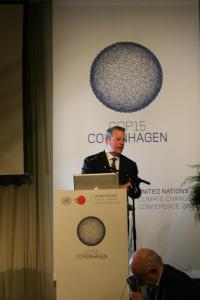I have been reflecting on what I have gained from COP15 and Denmark. And interestingly enough the most memorable moments aren’t as much from their connection to the conference but to the people.
During the one week course I met extraordinary people who were engaged and involved in what some have called the Environmental Movement, but also people who just simply wanted to help each other. That is what I recall to be the most poignant aspects of COP15, is citizens worldwide who were committed to addressing and adapting for themselves and for others.
Politicians have recognized this aspect as well
COP15 did not quell my suspicions about politicians negotiating in vague terms with no strong commitment to addressing climate change, but it showed me all of the individuals who aren’t waiting for their politicians to take action, but demanding those changes through their own actions. Some have led the Copenhagen fallout to indicate “Climategate” and global warming hysteria that has no authoritative science backing it.
Others recognize how their actions affect people.
Some think American politicians have invested interests in non renewable resources
Others think Developed Countries are hoarding and polluting without helping to sustain Developing Countries:
All the various opinions in mind, I find it important that they are at any rate being expressed.
Aside from the public activism regarding the conference, I was also inspired by the kindness of the Danish people. There were several instances during my stay that had they happened in America may not have ended as pleasantly;
At one point I left my purse on the train and immediately a women noticed and called out, the guards noticed the situation and were able to obtain the purse for me by getting off the train and switching back to my stop. All the while another guard had his walkie talkie and assured me my purse would be returned. Sure enough it was, in the span of two minutes. Something tells me American guards may not be so considerate.
Another instance was during the day Adam Ellsworth and I volunteered at the REDD+ Gala event at the Royal Theater, of which I had originally thought to be in the Opera. After finding my way to the Opera, I spoke with the security guard there whom gave his best effort to help me determine where I needed to be. He even allowed me to use his computer to find the contact information and gave me a cup of coffee saying, “it is too early, you are thinking too much!”
And of course, my host family. As mentioned before Samantha and I stayed with a Danish family that was placed for us through New Life Copenhagen. Besides being more than hospitable by feeding us meals, waking us up in the morning, and driving us to and from the train station. They were lovely people whom I connected with and hope to see again. On the last day of our trip, they took Samantha, Ben, and I to Sweden on a day trip. My experience with them was a pleasant surprise and will leave a lasting impression on me.
Interacting with all of these individuals showed me something many Americans have seemed to forgotten; their sense of community. Reestablishing the importance of community and local support in areas can stimulate local economy and potentially make citizens more conscious of the products they consume.
Tak, Denmark.
-Renee
Filed under: Uncategorized | Leave a comment »







